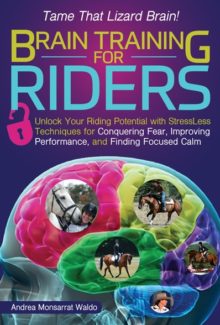Have you ever learned a jump course or dressage test by heart, only to have it vanish completely from your brain the second you enter the ring? In the warm-up, does your trainer’s voice sound like Charlie Brown’s teacher? When you’re nervous, do you find yourself reverting to bad habits such as leaning too far forward or tensing your hands on the reins? If so, you’re not alone. Almost everyone has difficulty thinking clearly when they are anxious. What is to blame for this frustrating phenomenon? The reptile brain.
The human brain has evolved over millions of years. Our oldest ancestors, namely reptiles, had a brain stem at the top of the spinal cord that regulated body functions—breathing, heartbeat etc.—and contained a survival mechanism called the Fight or Flight Response (FOFR). The FOFR caused the heart to pump faster, breathing to increase, and the blood to rush to the animal’s major muscle groups. When there was a predator around, the FOFR would be triggered and the reptile would have enough blood and oxygen surging into its muscles to fight or run away from the predator, thus saving it from becoming dinner.
Now fast forward a few million years. Homo Sapiens (that’s us) have developed. We still have a brain stem, but we have a lot of other brain structures as well, including the frontal lobe, located behind the forehead. The frontal lobe allows you to read and understand this sentence, as well as make a plan for dinner and remember to put a load of laundry in the washer. It does your verbal, complex and abstract thinking, and generally allows you to be smarter than, say, your horse.
The problem occurs when the brain perceives a threat. It could be physical, such as a car coming toward you, or psychological, such as your fear of the dressage judge’s criticism. The brain does not distinguish between these two types of threats; it considers both of them a danger to survival. When a threat is perceived, the reptile brain takes charge and overrides the frontal lobe. Rather than taking the time to stop and think about the problem, the reptile brain bypasses this step and activates the FOFR instantly. You literally can’t think logically or rationally, because this part of your brain has basically been shut down temporarily. In evolutionary terms, this makes perfect sense: if you stop to think about your options when you’re being attacked by a saber-toothed tiger, you aren’t likely to survive! However, it just isn’t especially helpful when you are facing a challenge such as riding a dressage test or navigating an equitation course.
Unfortunately, our brains have evolved this way for millions of years, so we can’t erase the FOFR; it’s coded into our DNA. However, recognizing that your FOFR is engaged is the first step to turning it off. When you notice that you’re tense, your heart is racing and your mind feels foggy, take several slow breaths. This cues your body to shut down the FOFR. (If you’re breathing deeply, you must not be running away anymore, so the coast must be clear…so the FOFR starts to deactivate.) Flex and release your muscles a few times, and remind yourself “That’s just my FOFR kicking in. My reptile brain thinks it’s being chased by a tiger, but I’m just fine.” This will help your reptile brain to calm down and allow your rational thinking to step back in and take charge again!



